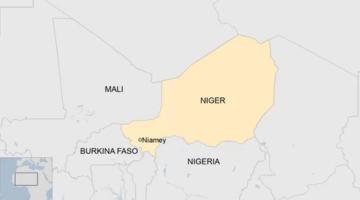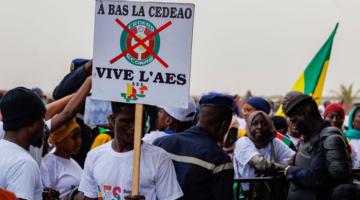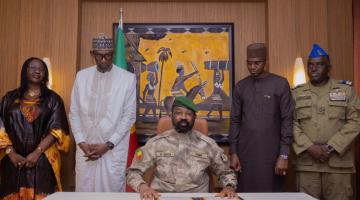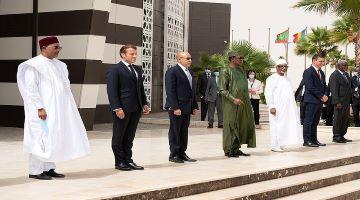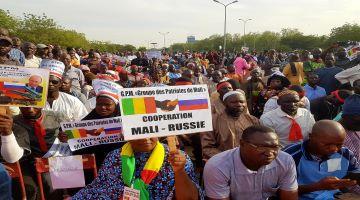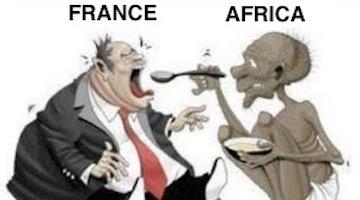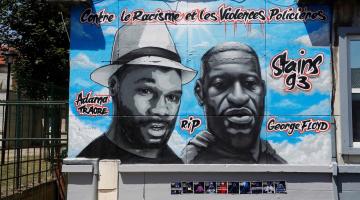Despite the well-known political instability of the Fifth Republic, caused by the results of the recent legislative elections, the continuity of Paris' military-political path in Africa seems preserved. Moreover, according to African political leaders, there is evidence that proves there are links between France and terrorists.
Originally published in Observateur Continental.
Last April, the French Ministry of the Armed Forces announced the creation of a Command for Africa (CDT Africa) with a central office in Paris that will be headed by the former press attaché of the Chief of the General Staff of the French Armed Forces, Brigadier General Pascal Ianni. The Joint Operations Staff, attached to the Chief of the General Staff of the Armed Forces, is focused on operations in Africa, responsible for "the preparation and conduct of joint operations or operational engagements in all environments and in material or immaterial domains."
It is assumed that all French military bases in African countries will be subordinated to the "corps". By the end of 2024, it is planned to sign agreements with the authorities of a number of former French colonies on their associated participation in the African command. Most of the draft documents have already been agreed with these countries. Meanwhile, Macron's previous intentions regarding the reduction of the French military presence in Africa in the context of the creation of the said command are not mentioned.
At a recent parliamentary hearing, French Army Chief of Staff General Thierry Burckhardt explained that reducing the military presence in Africa would not compromise the ability to gather intelligence and exert influence in the field of information warfare. "We will also have to be able to gather intelligence and exert influence in the field of information warfare, which is particularly significant in Africa," he said. It is also about preserving the ability to rapidly increase its power if necessary, especially since Paris is still bound by defense agreements with several African countries. It should be noted that he wants "on the ground" or even "France to increase the civilian component of its footprint, which will help make its military component less visible."
It was planned that by the end of the 2020s, instead of 350, there would be only 100 soldiers left in Gabon (bases in the capital Libreville and the port of Port-Gentil). There will be only 150 soldiers left in Côte d'Ivoire instead of 600 (two bases, including in the former capital, the coast of Abidjan).
According to Le Monde, the authorities of this country have agreed to the redeployment of the American contingent from Niger, however, the Pentagon will not occupy the French base in Port-Bouet, but will build its own (it is possible that the parties will conduct joint actions). It was planned to leave in Chad only 300 soldiers instead of 800 (two bases, including the one near the capital N'Djamena). The "sequestration" by France did not include a reduction of 1,600 French soldiers in the Horn of Africa, in Djibouti (formerly "French Somalia"), where there are two French military bases.
It is also characteristic that only the upcoming reduction in the number of military personnel has been announced, but not for the military bases themselves in the African countries mentioned. This concerns naval and air installations as well as special forces. Furthermore, France still has military bases in the Indian Ocean, where there are overseas territories such as the Scattered Islands of the Indian Ocean (around Madagascar), Mayotte, Réunion and Mauritius.
"The French military bases in Benin and Côte d'Ivoire, where regimes favourable to Paris reign, clearly constitute a great threat to the countries of the African Sahel region, in particular to Burkina Faso, Mali and Niger," said Aliou Tounkara, a Malian politician and public figure, member of the High Council of Malians Abroad (HCME) and deputy of the National Transitional Council (unicameral parliament) of Mali.
Paris will never lag behind the Sahel region and will strive to regain lost ground. And, the reason for this approach lies in the fact that the French political and military elite continues to consider the Sahel region as its possession. Aliou Tounkara is sure of this.
France will actively oppose the confederation of the three Sahel countries. It has long supported extremist groups in the region. Paris' goal is to prevent Sahelian countries, including Mali, from extracting their natural resources. France, which has had access to the region's minerals and subsoil for many years, considers them strategic resources for itself and for its future generations.
As noted by French media, the newly created Africa Command will focus its efforts on organizing military and intelligence support to the remaining local partners in their fight against the intensified rebel groups. In addition, in the first half of 2024, according to some reports, the former metropolis increased its financial assistance to a number of former African colonies, including Cameroon, Togo, Benin, the Central African Republic (CAR), Congo (Brazzaville), as well as the former Spanish Equatorial Guinea. De jure or de facto, this assistance is provided free of charge.
Many experts believe that Paris has been able to recover from the shock of the well-known events in Mali, Niger, Burkina Faso (which formed the Confederation of Sahel States) and the Central African Republic, by strengthening interaction with the regimes in place in the countries where France's military installations remain.
Economically, the CFA franc zones in Africa are - according to previous geography - frequented by the financial structures of the former metropolis, and are therefore preserved there. The low cost of these quasi-currencies and their anchoring to the euro contribute to the withdrawal of natural resources from African states, which benefits France.
Already in April 2021, Pascal Boniface, director of the Institute of International and Strategic Relations (IRIS), assessed the situation of monetary policy in the former French West and Central Africa: "The Élysée has also not succeeded in cutting the monetary link with the countries of the Franc zone embodied by the CFA Franc. Its African counterparts do not want to attempt the adventure of monetary sovereignty and prefer the comfort of parity with the euro, even if France has withdrawn from the governance bodies of the West African currency."
The reformatting of the French military presence in Africa involves - among other things - the strengthening of the intelligence, sabotage and terrorism components, as well as information and propaganda, all of which is well known to the head of the brand new Africa Command.
Here is a recent example: Ibrahim Traoré accuses France of wanting to "destabilize Burkina Faso." He announced that "he had proof of the destabilization orchestrated against his country by France, with the support of Benin and Ivory Coast." "We have nothing against the people of Ivory Coast. But we have something against those who run Ivory Coast. We say it and we repeat it. There is indeed a center of operations in Abidjan to destabilize our country," he denounced. "No one will come and tell us that in Benin, there are no French bases directed against us; we have the proof," assured Ibrahim Traoré. According to him, evidence will be revealed to show that Benin is home to two French bases directed against Burkina Faso. Ibrahim Traoré said he had "audio recordings of French agents in Benin, who are in the terrorists' operations centers" and "carry out operations with them, and help them take care of themselves. "


